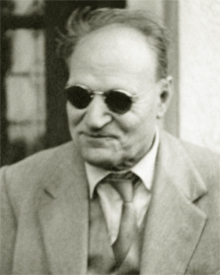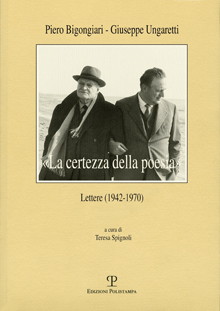Ricerca Veloce
Ricerca Avanzata

Giuseppe Ungaretti
Giuseppe Ungaretti nasce ad Alessandria d’Egitto nel 1888, da genitori toscani emigrati. Dopo gli studi liceali si trasferisce a Parigi, dove frequenta l’università e conosce esponenti della cultura francese, come i pittori Braque e Picasso, gli scrittori Apollinaire e Breton, ma incontra anche alcuni scrittori italiani (Soffici, Palazzeschi, Savinio) che di Parigi avevano fatto in quegli anni una seconda patria. Allo scoppio della prima guerra mondiale torna in Italia e si arruola come soldato semplice combattendo in prima linea sul fronte del Carso. La vita di trincea è un’esperienza decisiva per il poeta, che riconosce allora la propria specifica vocazione di scrittore. Negli anni successivi aderisce al fascismo lavorando come addetto culturale all’ambasciata italiana a Parigi. Corrispondente per i giornali «Il Popolo di Italia» e «La Gazzetta del Popolo», accetta nel 1931 la cattedra di letteratura italiana all’università di San Paolo in Brasile. Lì nel 1939 una tragedia sconvolge la sua esistenza: la morte del figlio Antonietto, di nove anni, in un incidente. Tornato in Italia, dal 1942 al 1958 insegna letteratura italiana all’università di Roma e continua la sua attività di poeta e uomo di cultura. Muore a Milano nel 1970. La poesia di Ungaretti è complessa e toccata da molteplici influenze. Col tempo sempre più importanza attribuirà al concetto di memoria, intesa nella sua accezione individuale come in quella derivante dal patrimonio collettivo di sapere cumulatosi nel corso delle epoche.
Giuseppe Ungaretti was born in Alessandria d’Egitto in 1888, from a family originally from Tuscany. After the high school he moved to Paris, where he attended the university and met some exponents of the French culture, such as the painters Braque and Picasso, the writers Apollinaire and Breton, and also some Italian collegues (Soffici, Palazzasci, Savinio) that had found in Paris their second homeland. At the beginning of the First World War, he came back to Italy and enlisted as private, fighting in the frontline in the Karst. The life in the foxhole is a pivotal experience for the poet, that finds there his vocation for writing. In the following years, he supports fascism working as cultural attaché at the Italian embassy in Paris. Correspondent for the newspapers “Il Popolo di Italia” and “La Gazzetta del Popolo”, he accepts, in 1931, the lectureship of Italian literature at the university of Sao Paul in Brazil. There, in 1939, his life is overturned by the tragic death of his 9-year son in an accident. Back in Italy, from 1942 to 1958 he taught Italian literature at the university of Rome and continued with his activity of poet and man of culture. He died in Milan in 1970. Ungaretti’s poetry is complex and influenced by several other styles. With the passing of time, he gave more and more importance to the concept of memory, both in its individual meaning and the one derived by the collective heritage of knowledge that increased through the ages.
Libri scritti da Giuseppe Ungaretti
«La certezza della poesia»
- € 20,40
- € 24,00
